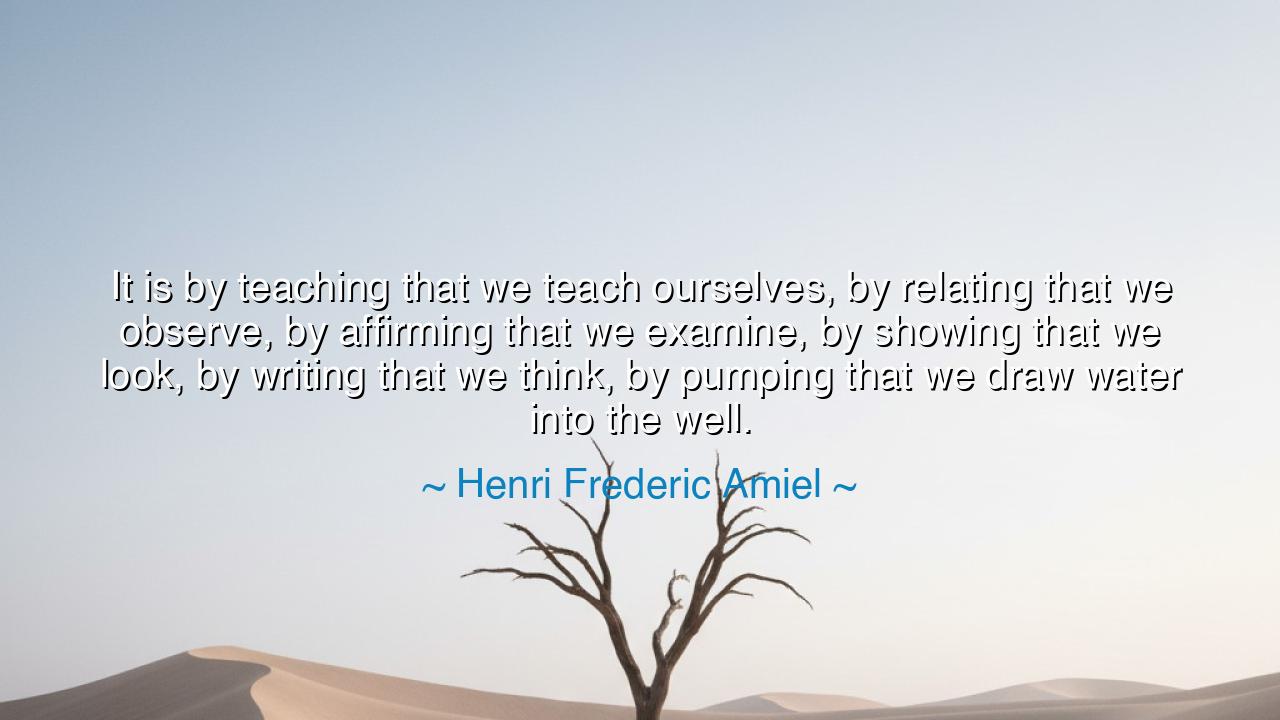
It is by teaching that we teach ourselves, by relating that we
It is by teaching that we teach ourselves, by relating that we observe, by affirming that we examine, by showing that we look, by writing that we think, by pumping that we draw water into the well.






Hear the words of Henri Frédéric Amiel, the philosopher of Geneva, who wrote in his journals the secret rhythms of the soul: “It is by teaching that we teach ourselves, by relating that we observe, by affirming that we examine, by showing that we look, by writing that we think, by pumping that we draw water into the well.” In these words lies a vision of human growth—that knowledge is not a treasure stored away, but a living current, flowing outward and returning richer than before. Wisdom is not gained in hoarding, but in giving.
The meaning is deep: when we teach, we sharpen our own understanding, for to explain a truth is to face its depths. When we relate, we open our eyes to what is around us, seeing what we had not seen before. When we affirm, we are compelled to question and weigh, lest our affirmation be empty. When we show, we must truly see; when we write, our thoughts take form; when we pump, the well of truth fills again. Amiel reminds us that the act of giving is also the act of receiving, and that in the labor of sharing, we are ourselves renewed.
Consider the life of Aristotle, who taught the young Alexander of Macedon. In the act of guiding his pupil, he deepened his own philosophy, refining ideas of ethics, politics, and nature. The master was shaped as much as the student, for the act of teaching demanded clarity and order that solitary thought alone could not bring. In forming the mind of a future conqueror, Aristotle also forged the enduring legacy of his own thought. Thus the teacher is also a learner, the giver also a receiver.
History too gives us the story of Anne Frank, whose diary in hiding became her companion. By writing, she did not simply record her days—she thought, she reflected, she gave form to the inexpressible. Her act of writing drew forth from her a strength and clarity that might have remained buried had she kept her silence. Just as Amiel taught, in the pouring out of words the well of her spirit was filled again, and the world now drinks from her reflections long after her time.
This truth also reveals the humility of learning: that man is not a vessel filled once and complete, but a well that must be pumped, a flame that must be tended. We may believe ourselves wise, but until we speak, teach, or write, our knowledge remains half-formed. It is only in expression, in the act of sharing, that the fog clears and true understanding arises. To keep wisdom hidden is to let it stagnate; to share it is to let it flow, cleansing and refreshing all who drink of it—including ourselves.
O children of tomorrow, take this lesson into your lives: do not wait until you believe yourself perfect in wisdom before you teach, speak, or write. Begin now, for it is in the beginning that wisdom unfolds. Speak your truth, and it will sharpen; write your thoughts, and they will grow clear; show your deeds, and your eyes will open to their meaning. The act of giving is the act of becoming.
Therefore, live by this practice: teach what you know, even if you know little. Write your thoughts, even if they seem scattered. Speak what you see, even if you fear it small. For by doing so, you deepen yourself. You will find, as Amiel promised, that by pumping, you fill the well; by pouring yourself out, you are replenished.
Thus his words endure as a fountain for all ages: “It is by teaching that we teach ourselves, by relating that we observe, by affirming that we examine, by showing that we look, by writing that we think, by pumping that we draw water into the well.” Take them as a command: share, express, labor—and in so doing, become whole.






AAdministratorAdministrator
Welcome, honored guests. Please leave a comment, we will respond soon